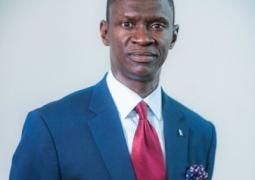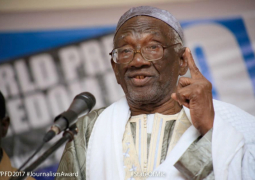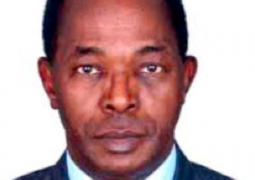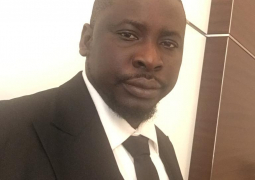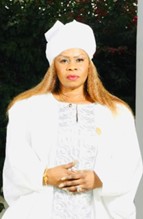
In a candid interview, the outspoken businesswoman-turned-politician opens up about her journey, her rejection of toxic politics, and her grassroots vision for a new Gambia.
At her serene residence in Bijilo, framed by the rustle of palms and the distant hum of the Atlantic, Marie Sock leans into her words with conviction. Once dubbed “The Iron Lady” for her fearless foray into Gambian politics, she is not just a former presidential candidate. She is a mother, a businesswoman, and a tireless reformer with a lifelong mission: to serve her people, not to rule over them.
Her political journey began not in the dusty corridors of party offices but in the heartbreak of burying her father in 2013, shortly after returning home from the United States. By 2015, as Gambians clamoured for change under the shadows of dictatorship, she was drawn into the movement. Sock joined the Gambia Democratic Congress (GDC), where her flair for branding and public engagement earned her national attention.
“I was just into everything,” she recalled. “I was branding the leader himself and trying to create an image of change. But along the way, I realised it was all the same politics.”
Her early experience left her disillusioned. She soon distanced herself from partisan politics, rejecting what she saw as recycled leadership in shiny new packaging. “Old wine in new bottles,” she quipped. What followed was not retreat, but recalibration.
Sock poured herself into humanitarian work through her foundation, quietly building her credibility in youth development, women’s empowerment, and peace building. Yet it was during one of her youth conferences intended to foster unity during the post-Jammeh transition that the call to politics came again.
“The young people told me, ‘We don’t see you in politics anymore. We need your voice’,” she said. Initially hesitant, she was eventually persuaded but only on her own terms.
“I didn’t leave my children in America to come and build kingdoms for people,” Sock stated. “I came to help create a leadership that listens, that serves, that puts people first.”
And so, her independent movement was born founded not on tribal allegiance or elite backing, but with a coalition of youth and women who shared a dream for a different Gambia. Her idea was simple but revolutionary: to run as an independent, with a civic movement operating as a pressure group to hold her government accountable.
“Too much time is wasted in political campaigns,” she said. “If elected, my cabinet will govern, and the movement will monitor implementation.”
But Sock’s rise hasn’t been without resistance. Her appearance light-skinned, short-haired and modern challenges many Gambians’ expectations of what a female leader should look like. Some dismissed her as “too different” to represent them.
“People told me I don’t look Gambian,” she said, shaking her head. “But what does a Gambian look like? We come in all shades, with all hair types. I’m 100% African, and I don’t need to conform to stereotypes to prove my patriotism.”
Sock, who turned 58 this July, argues that Gambians need to redefine identity beyond tribal, racial or aesthetic boundaries. Her platform emphasises diversity, inclusion and national pride built on culture, not cosmetic appearance.
Unlike many of her political counterparts, Sock’s leadership is rooted in decades of real-world experience across continents. In Spain, she founded three successful businesses, employing over 18 people. In the U.S., she became a certified car dealer, loan officer, and travel agent. She also co-owned agencies and supported her siblings and parents through entrepreneurship.
“I’ve worked as a cashier, a model, a businesswoman, and I’ve cleaned floors,” she recounted. “America taught me to be tough, to work hard, and to build from scratch. That’s what I bring to the table.”
“I’ve never been the type of boss who sits on a throne,” Sock said. “My staff become family. We eat together, laugh together and grow together. That’s how I lead.”
It’s this same philosophy she hopes to bring into national governance where ministries would be led by technocrats, not political cronies, and performance would be tracked with real accountability.
Looking ahead to the 2026 presidential elections, Sock remains cautious about making an early declaration of her candidacy, citing constitutional reforms and her dual citizenship status. But her movement is active, building quietly across the country, with volunteers engaging communities on core values and policy ideas.
With a blocked rice production project already under her belt, Sock says Gambia can feed itself. “A 50kg bag of organic rice at $13 is possible,” she insists, “but the government blocked it, fearing it would empower me politically.”
Marie Sock stressed the urgent need to address child street vending, asserting that no child should be forced to sell goods like ‘Nana’ to survive. As part of her education reform plans, she advocates compulsory internship programs for high school and college graduates to build real-world experience. She also promotes the inclusion of Gambian languages in school curricula to foster cultural pride and multilingual proficiency from an early age.
Sock envisions a transformed health sector with fully functional clinics and hospitals equipped to meet national demands. Her goal is to build a system that eliminates the need for Gambians to seek basic medical care outside the country.
“We talk about sovereignty, but we import everything from vegetables to our own identity,” Sock laments. “Let’s grow Gambian food, teach Gambian history, sing Gambian music, and wear Gambian-made clothes.”
Marie Sock’s political rhetoric departs from the familiar finger-pointing of Gambian politics. Her call is one of unity, not division. She wants the country to move past tribalism, past gender bias, and towards a future defined by competence, compassion, and common purpose.
She is also deeply invested in peace. Ahead of the next elections, she’s urging Gambians especially the youth to stay united and avoid being used as political pawns. “We must not fight each other for people who won’t even remember our names once they win,” she advises.
Despite a toxic political climate and being underestimated for her gender, Sock remains unshaken and foresighted.
Read Other Articles In Opinion
